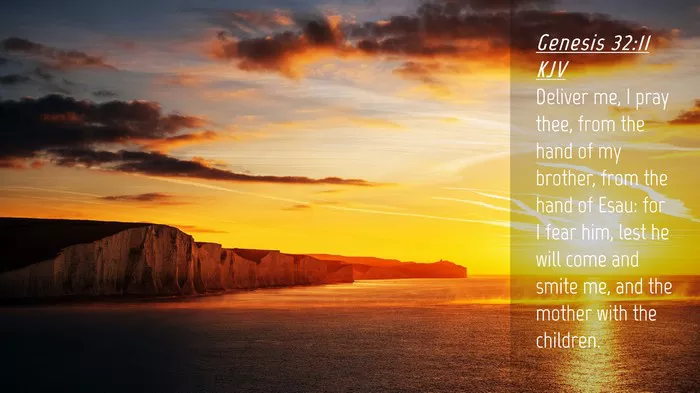Read the Daily Bible Verse – Genesis 32:11 To Strengthen Your Spiritual Journey.
In Genesis 32:11, Jacob utters a prayer to God as he approaches a perilous meeting with his estranged brother, Esau. This moment comes after years of separation, during which Jacob has been blessed with wealth, family, and favor, yet his past haunts him. Jacob’s prayer in this verse is a plea for safety: “Deliver me, I pray thee, from the hand of my brother, from the hand of Esau: for I fear him, lest he will come and smite me, and the mother with the children.”
Understanding this verse’s context requires examining Jacob’s history. Jacob, who had once deceived Esau, feels his life and family are at risk. With a heart of both fear and humility, Jacob appeals to God’s mercy, acknowledging his unworthiness and complete dependence on divine intervention. This prayer is a humble cry for protection, not merely against physical harm but against the haunting consequences of a fractured relationship and Jacob’s past actions.
The Genesis 32:11 Meaning
Genesis 32:11 captures several layers of meaning. On the surface, Jacob’s request for deliverance reflects his vulnerability and awareness of the potential consequences of his past actions. On a deeper level, it signifies a turning point for Jacob spiritually, as he shifts from his own schemes to genuine reliance on God’s mercy. The phrase “Deliver me” reflects an admission that only God can save him, a departure from his earlier tendencies of manipulation and self-reliance. By praying this way, Jacob confesses his fear of Esau and, in doing so, acknowledges both his guilt and his hope for reconciliation.
This verse reflects a timeless human need for forgiveness and grace in relationships. It speaks to anyone who has ever sought forgiveness, struggled with past mistakes, or experienced the need for reconciliation.
Genesis 32:11 Application in Life
Learning Humility and Dependence on God
Jacob’s prayer teaches humility. When faced with problems beyond his control, Jacob no longer relies on his own cunning but openly appeals to God. This verse teaches believers that humility is key to receiving God’s help and peace, showing us that self-reliance can only take us so far.
Seeking Reconciliation and Healing Past Wrongs
Jacob’s fear is both physical and emotional, as he dreads the pain of unresolved family conflict. His prayer reminds us that addressing wrongs, seeking forgiveness, and desiring reconciliation are essential for healing. Through God’s help, we can confront our own “Esau moments,” approaching difficult situations with faith rather than fear.
Recognizing God’s Faithfulness Amid Uncertainty
Jacob reminds God of His promises, even amid fear. When we face trials, this scripture encourages us to hold fast to God’s Word and trust in His steadfast love. By anchoring ourselves in God’s promises, we can find peace despite our circumstances.
Comparison with Other Biblical Texts
Genesis 32:11 can be compared with several other scriptures, each emphasizing different facets of reliance, humility, and reconciliation:
Psalm 46:1 – “God is our refuge and strength, a very present help in trouble.” Like Jacob’s appeal to God for deliverance, this Psalm affirms that God is the ultimate refuge.
Matthew 6:14-15 – In the New Testament, Jesus teaches about forgiveness: “For if ye forgive men their trespasses, your heavenly Father will also forgive you.” Jacob’s attempt to reconcile with Esau mirrors the teachings of Jesus, emphasizing the importance of forgiveness and restored relationships.
James 4:6 – “God resisteth the proud, but giveth grace unto the humble.” Jacob’s humble posture and acknowledgment of his unworthiness align with this verse, which encourages humility to receive God’s grace.
Romans 12:18 – “If it be possible, as much as lieth in you, live peaceably with all men.” Jacob’s effort to make peace with Esau illustrates this teaching, serving as a model for all who seek harmony in their relationships.
Modern-Day Relevance
In our complex, fast-paced lives, Genesis 32:11 holds a profound relevance. Today, people face broken relationships, fears about past mistakes, and anxiety over future consequences. Just as Jacob approached God in prayer, we too can turn to God for guidance, strength, and reconciliation.
Jacob’s vulnerability resonates with anyone who has experienced fear, regret, or insecurity. In a world that often values self-reliance and independence, Genesis 32:11 reminds believers of the beauty in seeking God’s help and the courage required to mend broken bonds. This verse is a call to address our fears and face the challenges of reconciliation, anchored in God’s love and promises.
Conclusion
Genesis 32:11 is a prayer marked by humility, dependence, and the hope for reconciliation. Jacob’s plea for deliverance encapsulates the universal need for God’s mercy and strength in times of trial. This verse encourages believers to humbly seek God’s help, confront unresolved conflicts, and trust in His promises. By examining Jacob’s prayer and its lessons, we see a roadmap for navigating our own fears, broken relationships, and personal challenges.
Genesis 32:11 Commentary
Commentators on Genesis 32:11 often highlight Jacob’s journey toward spiritual maturity. This prayer represents a pivotal moment of transformation, where Jacob, once known for his cunning, recognizes his limitations and places his trust entirely in God. By appealing to God for deliverance, Jacob invites divine intervention, transforming his fear into faith and his past wrongs into a path toward reconciliation. The prayer in Genesis 32:11, therefore, becomes a powerful testament to God’s faithfulness and forgiveness, offering timeless guidance for all who seek peace, healing, and redemption.
Related topics:
- What Does Genesis 32:10 Mean?
- Genesis 32:9 Meaning, Context & Commentary
- What Does Genesis 32:8 Mean?

